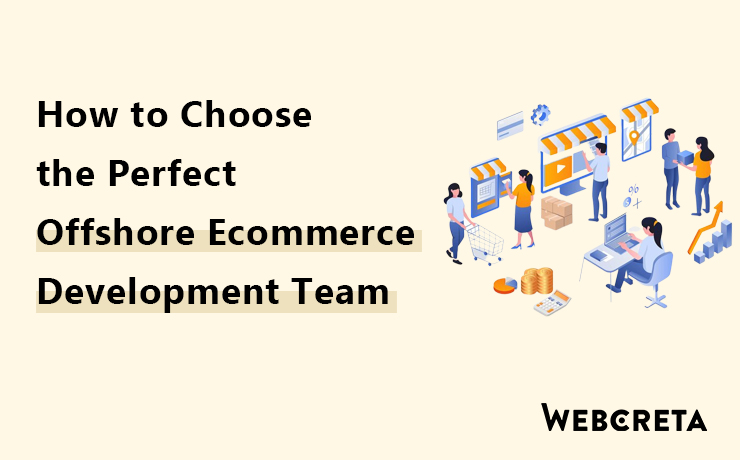How to Choose the Perfect Offshore Ecommerce Development Team

Table of Contents
Imagine building your dream online store – it’s exciting, right? But here’s the thing, Choosing the right team to make it happen is a big deal. As businesses increasingly recognize the Benefits of offshore development, the quest for the perfect offshore e-commerce team becomes paramount. In today’s digital world, where every click matters, let’s take a closer look together. This guide is your compass, leading you through the intricacies of selecting the optimal offshore e-commerce development team. From understanding the nuanced reasons behind choosing this path to the specific steps that ensure a smooth and successful collaboration, we’re here to demystify the entire process.
Why Consider Offshore Development
Before we dive into the steps, let’s understand why people are leaning towards offshore teams. It’s not just about saving costs, it’s about tapping into a global pool of talent, having work happening 24/7 across time zones, and the flexibility to scale your project as needed. So, grab your virtual passport – we’re about to explore the world of offshore e-commerce development!
Reasons to Build an Offshore eCommerce Development Team

A. Cost Efficiency: Offshore teams often operate in regions with lower labor costs, allowing businesses to significantly reduce development expenses without compromising on quality.
B. Access to Global Talent: Tap into a diverse pool of skilled professionals from around the world, gaining access to a wide range of expertise and fresh perspectives that can enhance your project.
C. 24/7 Productivity: Leverage time zone differences to your advantage. An offshore team can work on your project while your in-house team rests, leading to continuous progress and faster turnaround times.
D. Scalability: Offshore teams offer scalability, allowing you to easily adjust the size of your development team based on project requirements. This flexibility ensures efficient resource allocation.
E. Specialized Skills: Access specialists in specific technologies or frameworks that might be challenging to find locally. Offshore teams often have a diverse skill set that can cater to the unique needs of your eCommerce project.
F. Focus on Core Competencies: By outsourcing development tasks to an offshore team, your in-house team can focus on core business activities, strategic planning, and customer engagement, enhancing overall productivity.
G. Faster Time-to-Market: The combined effort of an in-house and offshore team can accelerate the development process, allowing your eCommerce project to go live faster and gain a competitive edge.
H. Risk Mitigation: Spread the risk by having a geographically diverse team. This minimizes the impact of unforeseen events, such as natural disasters or economic downturns, on your development process.
I. Language and Cultural Affinity: Many offshore teams are proficient in English and culturally adaptable, facilitating smooth communication and collaboration. This cultural affinity contributes to a cohesive working environment.
J. Global Perspective: Gain a global perspective on market trends and user behaviors. An offshore team can provide valuable insights into different markets, helping you tailor your eCommerce platform to a diverse audience.
K. Focus on Innovation: Offshore teams often bring a fresh perspective and innovative ideas to the table, contributing to the overall creativity and uniqueness of your eCommerce development project.
Steps to Offshoring eCommerce Development Team
A. Find Your Project Requirements: Conduct a comprehensive analysis of your project requirements, outlining specific features, functionalities, and goals. Define the scope, budget, and timeline to provide a clear roadmap for your offshore team.
B. Search and Shortlist Offshore Partners: Explore a variety of offshore development partners by conducting thorough research. Consider factors such as industry reputation, project portfolios, client reviews, and case studies. Create a shortlist of potential partners based on their expertise and alignment with your project.
C. Assess Technical Expertise: Dive into the technical capabilities of each shortlisted partner. Evaluate their proficiency in relevant technologies, frameworks, and methodologies. Request and review samples of their code, previous projects, or participate in technical discussions to ensure their skills match your project needs.
D. Cultural Compatibility: Recognize the importance of cultural alignment for effective collaboration. Assess the cultural fit by understanding communication styles, work ethics, and team dynamics. Look for offshore teams that share similar values and can seamlessly integrate with your company culture.
E. Security Measures: Prioritize the security of your project and data. Inquire about the security measures implemented by offshore teams, including data encryption, access controls, and compliance with industry standards. Ensure that the chosen partner follows robust security practices to safeguard your sensitive information.
F. Communication Protocols: Establish clear communication channels and protocols to facilitate effective collaboration. Define the tools and platforms for communication, project management, and reporting. Consider the time zone differences and set expectations for regular meetings and updates to maintain transparency and alignment.
G. Legal and Contractual Aspects: Navigate the legal landscape of offshoring by carefully reviewing and negotiating contracts. Address aspects such as intellectual property rights, confidentiality agreements, project milestones, and payment terms. Ensure that the contractual agreement aligns with both parties’ expectations and protects the interests of your business.
H. Trial Period or Pilot Project: Mitigate risks by initiating a trial period or a small-scale pilot project with the chosen offshore team. This allows you to evaluate their performance, adherence to timelines, and the quality of their work before committing to a long-term partnership.
I. Continuous Evaluation and Improvement: Implement a system for continuous evaluation and improvement. Regularly assess the performance of the offshore team against predefined metrics and key performance indicators (KPIs). Provide constructive feedback and collaborate on improvements to enhance the efficiency of the development process.
J. Build a Strong Relationship: Foster a collaborative and trusting relationship with your offshore team. Encourage open communication, cultural exchange, and regular team-building activities. A strong relationship contributes to a positive working environment and ensures the success of your e-commerce development project.
Conclusion
So, there you have it – going for an offshore team is like opening a treasure chest for your online business. It’s cost-effective, brings in skills from around the world, and keeps your project ticking 24/7. Now, as we wrap up, remember: finding the right offshore team isn’t just a choice; it’s your secret weapon for a thriving online venture. With these reasons and steps in mind, you’re not just building a website – you’re crafting a digital success story. So, go ahead, team up with the perfect offshore partner, and watch your e-commerce dreams take flight!
About Webcreta Technologies
When it comes to transforming your e-commerce dreams into reality, Webcreta Technologies stands as the beacon of excellence. As a leading player in the industry, We emerges as the Best ecommerce development company, providing unparalleled solutions tailored to your unique business needs. With a commitment to innovation and a team of seasoned experts, they offer the perfect synergy of skill and creativity. Ready to elevate your online store? Hire ecommerce developers from us, where expertise meets a passion for crafting digital success stories.



